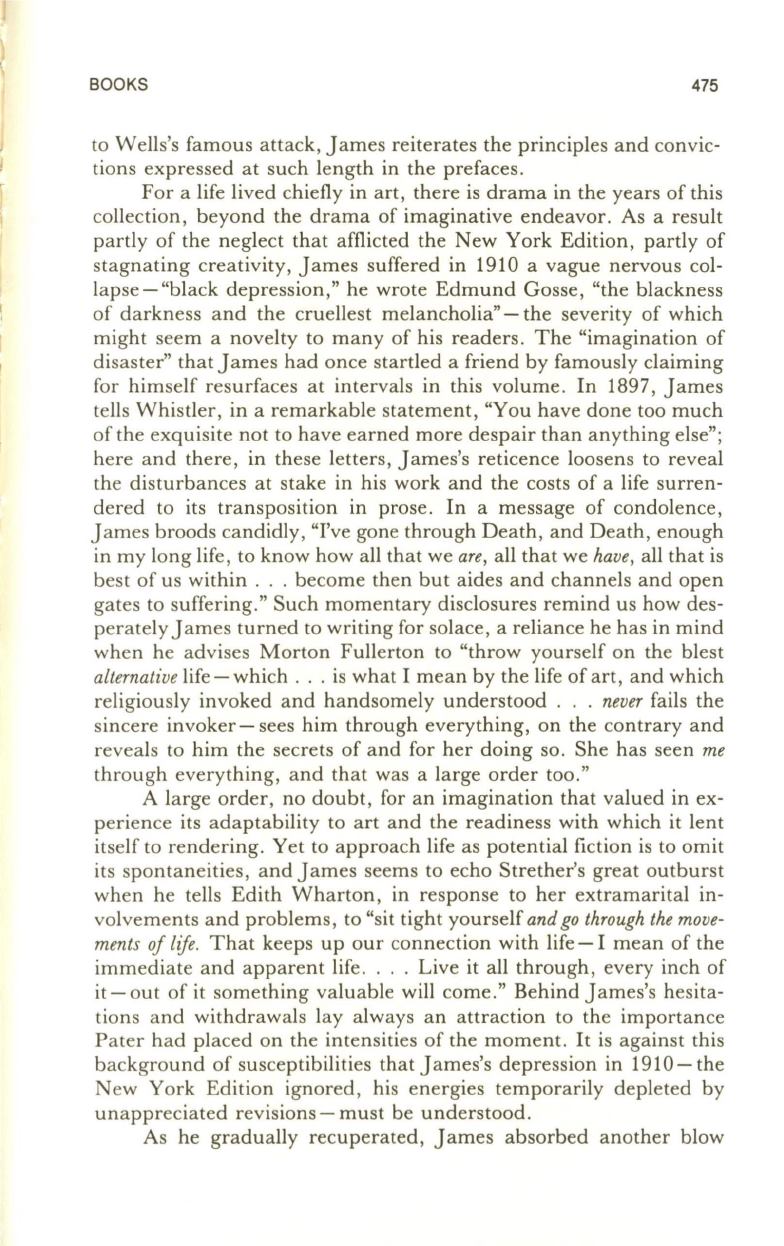
BOOKS
475
to Wells's famous attack, James reiterates the principles and convic–
tions expressed at such length in the prefaces.
For a life lived chiefly in art, there is drama in the years of this
collection, beyond the drama of imaginative endeavor. As a result
partly of the neglect that afflicted the New York Edition, partly of
stagnating creativity, James suffered in 1910 a vague nervous col–
lapse-"black depression," he wrote Edmund Gosse, "the blackness
of darkness and the cruellest melancholia" - the severity of which
might seem a novelty to many of his readers. The "imagination of
disaster" that James had once startled a friend by famously claiming
for himself resurfaces at intervals in this volume . In 1897, James
tells Whistler, in a remarkable statement, "You have done too much
of the exquisite not to have earned more despair than anything else";
here and there, in these letters, James's reticence loosens to reveal
the disturbances at stake in his work and the costs of a life surren–
dered to its transposition in prose. In a message of condolence,
J ames broods candidly, "I've gone through Death, and Death, enough
in my long life, to know how all that we
are,
all that we
have,
all that is
best of us within ... become then but aides and channels and open
gates to suffering." Such momentary disclosures remind us how des–
perately James turned
to
writing for solace, a reliance he has in mind
when he advises Morton Fullerton to "throw yourself on the blest
alternative
life - which . .. is what I mean by the life of art, and which
religiously invoked and handsomely understood ...
never
fails the
sincere invoker- sees him through everything, on the contrary and
reveals to him the secrets of and for her doing so. She has seen
me
through everything, and that was a large order too."
A large order, no doubt, for an imagination that valued in ex–
perience its adaptability to art and the readiness with which it lent
itself to rendering. Yet to approach life as potential fiction is to omit
its spontaneities, and James seems to echo Strether's great outburst
when he tells Edith Wharton, in response to her extramarital in–
volvements and problems, to "sit tight yourself
and go through the move–
ments oj life.
That keeps up our connection with life - I mean of the
immediate and apparent life . . . . Live it all through, every inch of
it-out of it something valuable will come." Behind James's hesita–
tions and withdrawals lay always an attraction to the importance
Pater had placed on the intensities of the moment.
It
is against this
background of susceptibilities that James's depression in 1910-the
New York Edition ignored, his energies temporarily depleted by
unappreciated revisions - must be understood.
As he gradually recuperated, James absorbed another blow


